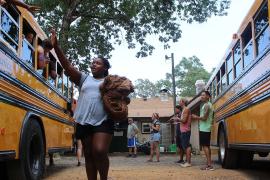- Have a clear understanding of your camp policy definitions of powerful words such as abuse, harassment, assault, consent, and grooming so that if a camper describes something that happened you are prepared.
- Never minimize a camper’s experience of trauma by saying things like, “At least that didn’t happen,” or “It could have been so much worse.”
- Speak to your camp administrator or division head about who can co-facilitate a bunk discussion on how to speak up if something feels unsafe or crosses a camper’s personal boundaries (but don’t have that conversation without it being camp sanctioned).
- There is no such thing as “boys will be boys,” “campers will be campers,” or “girls will be girls,” especially when we are discussing hazing, bullying, assault, harassment, and sexual abuse. So if you find yourself thinking, “I am sure this is normal,” go find someone from your camper care team and communicate what you observed.
- Don’t be afraid to bump something up. If you feel that someone has crossed a boundary with a camper — BUMP IT UP to a supervisor. You could be wrong. But you also could be right.
- Ask your admin for a list of the boundary policies on how staff and campers interact. Are there places that staff are not allowed to go with campers? Do you have a sense of how to know what the boundaries are based on your specific job in camp?
- Never ask a camper to keep a secret for you or from anyone else. If you find out that a staff member has asked a camper to keep a secret, BUMP IT UP.
- If a camper tells you something happened that is unsafe or traumatic, look them in the eye and don’t lose your cool. It is your responsibility to stay calm and allow the child to speak and be believed. Never promise that you won’t tell anyone, but do not gossip about it with your friends.
- Learn how to create private moments in public spaces so that you are never alone one-on-one with a camper.
- If you suspect abuse or harassment — even if you aren’t sure — BUMP IT UP.
The views and opinions expressed by contributors are their own and do not necessarily reflect the views of the American Camp Association or ACA employees.

